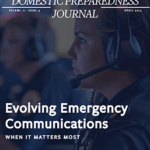Terrorism, transnational criminal organizations, critical infrastructure attacks, and cyberattacks are just a few of the top 2024 threats identified in the U.S. Department of Homeland Security’s latest Homeland Threat Assessment. The homeland security landscape has profoundly transformed since the terrorist attacks on September 11, 2001. The generation that answered that call has largely retired, passing the torch to a new breed of leaders who face different challenges. In addition, the threats have become more complex and dynamic in an era of rapid technological advancement and global interconnectedness.
Applying Academic Learning
Educational opportunities must evolve to keep up with the changing threat landscape, which requires forward-thinking academics and practitioners. However, education in a classroom, online, with a hybrid approach, or self-study courses should impart more than just knowledge. An effective program empowers students to apply that knowledge within their respective agencies and organizations. Since 2001, homeland security educational programs have expanded to include graduate degrees. Higher-education opportunities can help cultivate critical thinkers who can translate theory into action by implementing strategies and policies that help enhance domestic security. By blending academic theory with real-world applications, students can acquire the analytical skills and strategic mindset necessary to confront the complex challenges of the 21st century.
In addition, graduate degree programs in homeland security provide the tools for practitioners to apply their homeland security research findings to inform strategic initiatives within their agencies or even to help draft and implement new legislation. Agencies working together to build effective relationships before disasters are better positioned to mitigate risk and save lives. The same can be true for relationships that educational institutions promote by bringing together practitioners from across disciplines and jurisdictions to collaborate on complex issues like cybersecurity and AI, as well as to look beyond the horizon for emerging challenges in the short- and long-term. The diversity of disciplines and agencies in each classroom enhances the perspectives of the entire homeland security community. For example, public health, transportation, utilities, the military, and the private sector all have important roles in the larger homeland security mission. The impact of homeland security higher education extends far beyond the walls of academia. Collaborative research, shared experiences, and multidisciplinary interactions within the classroom can help strengthen interagency relationships and increase the resilience and adaptability of practitioners and their communities after graduation.
Evolving to Meet New Needs
It can be daunting to think about all the threats communities face and how to keep pace as new threats emerge. However, in an academic environment, students can make evidence-based assertions and ask questions without feeling the pressure to have all the answers. Empowering students within an educational environment makes it more likely they will share best practices with the agencies in their communities or use a thesis to solve a wicked problem they face in the field. Whether taking a homeland security course or developing homeland security efforts for a community, consider the following actions:
- Embrace new technologies and methodologies,
- Be resilient in the face of adversity,
- Commit to safeguarding the nation’s well-being,
- Understand that the key to effective security lies not just in physical defenses but in cultivating a resilient and cohesive society, and
- Encourage self-care, such as seeking mental health, to strengthen first responders.
Whatever comes next in the evolution of homeland security, education and training will remain critical components that will continually evolve. Despite the daily demands of their jobs, first responders and public safety professionals should consider adding the challenge of an academic program to equip themselves and better protect their communities. Every person in public service and emergency response should feel the pressure of thinking beyond their agency mission. Modern threats transcend city limits and national borders. In today’s interconnected world, events happening thousands of miles away can have direct repercussions on local communities.
Game-changing technologies like AI require analysis and collaboration unlike anything experienced before. While AI holds immense potential for enhancing homeland security, it could be exploited to undermine security as well. The potential for AI to be utilized by malicious actors to orchestrate sophisticated cyberattacks is now easier and more available to those who would do harm. Keeping up with these types of threats requires learning from one another. Recognizing the interconnected nature of security challenges requires education and a coordinated, proactive approach to prevention and mitigation rather than merely reacting to crises as they arise.
The necessity of higher education programs in homeland security cannot be overstated when it comes to bolstering the security of the United States. Practitioners and academics engaged in policy and strategy research enhance the effectiveness of implementing timely and successful plans within the homeland security community. Thankfully, numerous undergraduate and graduate homeland security education programs exist in colleges and universities across the nation, each serving as a vital component in the training of the next generation of security professionals. These programs equip students and practitioners with the requisite critical thinking, practical skills, and tools needed to address the intricacies of modern security challenges.

Heather Issvoran
Heather Issvoran is the director of strategic communications for the Center for Homeland Defense and Security at the Naval Postgraduate School.
- Heather Issvoranhttps://www.domesticpreparedness.com/author/heather-issvoran






